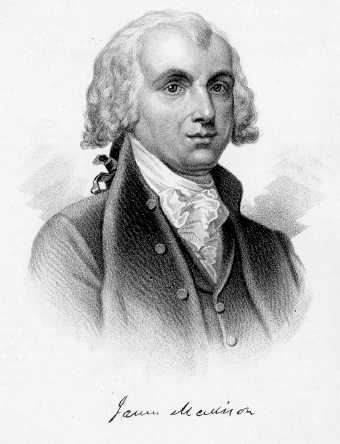32 JAMES
MADISON.
JAMES
MADISON.
intellectual, social and moral worth, contributed
not a little to his subsequent eminence. In the year
1780, he was elected a member of the Continental
Congress. Here he met the most illustrious men in our
land, and he was immediately assigned to one of the
most conspicuous positions among them.
For three years Mr. Madison
continued in Congress, one of its most active and
influential members. In the year 1784, his term having
expired, he was elected a member of the Virginia
Legislature.
No man felt more deeply than Mr.
Madison the utter inefficiency of the old confederacy,
with no national government, with no power to form
treaties which would be binding, or to enforce law.
There was not any State more prominent than Virginia
in the declaration, that an efficient national
government must be formed. In January, 1786, Mr.
Madison carried a resolution through the General
Assembly of Virginia, inviting the other States to
appoint commissioners to meet in convention at
Annapolis to discuss this subject. Five States only
were represented. The convention, however, issued
another call, drawn up by Mr. Madison, urging all the
States to send their delegates to Philadelphia, in
May, 1787, to draft a Constitution for the United
States, to take the place of that Confederate League.
The delegates met at the time appointed. Every State
but Rhode Island was represented. George Washington
was chosen president of the convention; and the
present Constitution of the United States was then and
there formed. There was, perhaps, no mind and no pen
more active in framing this immortal document than the
mind and the pen of James Madison.
The Constitution, adopted by a vote
81 to 79, was to be presented to the several States
for acceptance. But grave solicitude was felt. Should
it be rejected we should be left but a conglomeration
of independent States, with but little power at home
and little respect abroad. Mr. Madison was selected by
the convention to draw up an address to the people of
the United States, expounding the principles of the
Constitution, and urging its adoption. There was great
opposition to it at first, but it at length triumphed
over all, and went into effect in 1789.
Mr. Madison was elected to the House
of Representatives in the first Congress, and soon
became the avowed leader of the Republican party.
While in New York attending Congress, he met Mrs.
Todd, a young widow of remarkable power of
fascination, whom he married. She was in person and
character queenly, and probably no lady has thus far
occupied so prominent a position in the very peculiar
society which has constituted our republican court as
Mrs. Madison.
Mr. Madison served as Secretary of
State under Jefferson, and at the close of his
administration was chosen President. At this time the
encroachments of England had brought us to the verge
of war.
British orders in council destroyed
our commerce, and our flag was exposed to constant
insult. Mr. Madison was a man of peace. Scholarly in
his taste, retiring in his disposition, war had no
charms for him. But the meekest spirit can be roused.
It makes one's blood boil, even now, to think of an
American ship brought to, upon the ocean, by the guns
of an English cruiser. A young lieutenant steps on
board and orders the crew to be paraded before him.
With great nonchalance he selects any number whom he
may please to designate as British subjects; orders
them down the ship's side into his boat; and places
them on the gundeck of his man-of-war, to fight, by
compulsion, the battles of England. This right of
search and impressment, no efforts of our Government
could induce the British cabinet to relinquish.
On the 18th of June, 1812, President
Madison gave his approval to an act of Congress
declaring war against Great Britain. Notwithstanding
the bitter hostility of the Federal party to the war,
the country in general approved; and Mr. Madison, on
the 4th of March, 1813, was re-elected by a large
majority, and entered upon his second term of office.
This is not the place to describe the various
adventures of this war on the land and on the water.
Our infant navy then laid the foundations of its
renown in grappling with the most formidable power
which ever swept the seas. The contest commenced in
earnest by the appearance of a British fleet, early in
February, 1813, in Chesapeake Bay, declaring nearly
the whole coast of the United States under
blockade.
The Emperor of Russia offered his
services as meditator. America accepted; England
refused. A British force of five thousand men landed
on the banks of the Patuxet River, near its entrance
into Chesapeake Bay, and marched rapidly, by way of
Bladensburg, upon Washington.
The straggling little city of
Washington was thrown into consternation. The cannon
of the brief conflict at Bladensburg echoed through
the streets of the metropolis. The whole population
fled from the city. The President, leaving Mrs.
Madison in the White House, with her carriage drawn up
at the door to await his speedy return, hurried to
meet the officers in a council of war. He met our
troops utterly routed, and he could not go back
without danger of being captured. But few hours
elapsed ere the Presidential Mansion, the Capitol, and
all the public buildings in Washington were in
flames.
The war closed after two years of
fighting, and on Feb. 13, 1815, the treaty of peace
was signed at Ghent.
On the 4th of March, 1817, his
second term of office expired, and he resigned the
Presidential chair to his friend, James Monroe. He
retired to his beautiful home at Montpelier, and there
passed the remainder of his days. On June 28, 1836,
then at the age of 85 years, he fell asleep in death.
Mrs. Madison died July 12, 1849.

